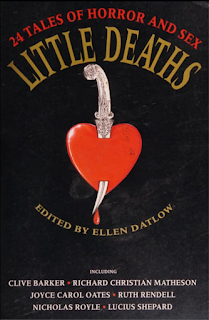Little Deaths first appeared in Great Britain, and when an American edition came out a year later it had a better cover but fewer stories; "The Careful Geometry of Love" was the only Koja or Malzberg contribution to survive the trip across the pond. Damn--the SF world is ruthless! Luckily you can get a British printing Little Deaths at ebay or do what I am doing, read a scan of a British edition at internet archive, world's greatest website. (If you read Polish, you are in luck, as the only other place "The Careful Geometry of Love" has appeared is in the Polish magazine Fenix, in 1996.
I will ask no questions, he said, I'm a professional. I run a studio, I'm a businessman. He heard the sound of her laughter, strident and focused in a way he could not fathom....Oh yes, she said, all of you are professionals. You are so serious....You ask no questions even when questions should be asked.
This story is a response to AIDS, or at least exploits the famous disease in an effort to make Barry's story of sexual frustration and incompatibility more "relevant" and more scary. In Malzberg's typical somewhat oblique fashion we observe the thoughts of Samuel as he goes to bed with women but ends up failing to have sex with them in a way that is humiliating. Sometimes Samuel expresses his unusual sexual desires to a woman and she rejects him; sometimes a woman reveals her unusual desires to him and he rejects her. Malzberg doesn't let on what the peculiar tastes in question might be--his story is not an exploitative one, the appeal of which is descriptions of nasty fetishes, but more a rumination about how difficult sexual relationships are, how our desires can't be fulfilled unless we open up ourselves to others, reveal our secrets and make ourselves vulnerable, and how such opening up can expose one to soul-destroying rejections.
Sam feels like a loser, he having bungled so many sexual encounters and, it seems, never won another person's sympathy or affection. He comes to believe that he can never reveal his secrets to others. He resorts (apparently--I don't think this is a dream or fantasy, but who knows with Malzberg?) to raping a woman. The twist ending is that one of Samuel's secrets is that he is HIV-positive. Has he just passed his disease on to an innocent stranger?
This story is OK, no big deal. The AIDS angle is sort of a let down, to be honest--the theme of the psychological risk of opening yourself up is timeless and universal, and the introduction of AIDS weakens the power of that theme by putting the story squarely in a particular time period and focusing on the particular problems of a particular community. And the mention of AIDS is the only element in the story that is that specific--Malzberg doesn't do anything beyond the mention of HIV to paint a compelling picture of a particular era or community, AIDS feels like it is just stuck in there, perhaps even gratuitously.
"The Disquieting Muse" by Kathe Koja
Somebody in Poland was really into Koja, I guess, because "The Disquieting Muse" also appeared in an issue of Fenix with a quite good robotic spider cover. The story would go on to be included in the 1998 Koja collection Extremities.For most of its length "The Disquieting Muse" is like a piece of mainstream fiction, lacking both SF elements and the kind of unconventional narrative techniques and punctuation we see in typical Malzberg-involved stories ("The Disquieting Muse" has quotation marks.) Jeremy works at a mental institution as an art therapist--he loves art, and majored in art as a student, but couldn't get a handle on the academic side and so was directed to this line of work. He has sessions with small groups of mental cases, three at a time, and Koja talks about how horribly these patients smell and their other bizarre idiosyncrasies--one woman, Ruth, refuses to wear street clothes, for instance, and is naked under her medical gown. Jeremy has turned out to be a good art therapist--the people whom he works with have "breakthroughs," and the shrinks appreciate, are grateful for, his accomplishments; Jeremy himself is more surprised at his own success than anybody.
Jeremy also has a girlfriend, Margaret, with whom he has an unfulfilling sexual relationship, he not being very good in bed; besides this shortcoming, there are hints that Jeremy is not very secure in his masculinity, has neuroses of his own, and is an incompetent artist--Jeremy is a loser.
Of today's three pieces "The Disquieting Muse" is the most sexually explicit and goes the furthest in the direction of being actually erotic with its descriptions of conventional sexual desire (e.g., Jeremy gets an erection after brushing against one of Ruth's big breasts) and more or less normal sexual activity (Margaret's cold white fingers on Jeremy's body) as well as weird fetishistic desires (does Jeremy enjoy the smells of unwashed maniacs?) and behavior (see below!)
Ruth turns out to be a skilled draughtsman and painter, and she always creates violent erotic images--a dissected stallion's penis, a man performing cunnilingus on a headless woman's torso, a little girl masturbating with a broken baseball bat--and Jeremy becomes attracted to her--he even fetishistically sleeps with her disturbing but arousing drawings. He thinks of Ruth while in bed with Margaret; he starts masturbating while looking at Ruth's art work; Ruth behaves in a way that breaks all social norms and seems calculated to seduce him. Who is in power in this twisted and strange relationship--is Jeremy abusing Ruth, a person who is seriously ill, or is Ruth manipulating him with her sexuality--or magic powers? In the final scene Jeremy either suffers a delusion or has revealed to him the astonishing supernatural reality of his life: Ruth is some kind of demon or witch who has used her magic to charm Jeremy and his life, to give him the luck that has made his career a success despite his lack of effort and ability. By ejaculating on a picture Ruth drew of herself, Jeremy unwittingly summons the filthy undressed and unwashed woman to his home where she grabs his genitals and squeezes--does she kill him or merely enslave him? In any case, his relationship with Margaret is over, the last sentence of the story pointing out that he no longer returns her calls.This is the most substantial and easiest to digest of today's stories, and the most effective as an erotic piece and as a horror piece. Thumbs up for "The Disquieting Muse."
**********These stories are all worth reading; maybe we'll hunt up some more Koja-Malzberg collabs and talk about them in future episodes of MPorcius Fiction Log. In this space here I'll provide links to earlier Kathe Koja coverage here at MPorcius Fiction Log.
"Angels in Love"
"Teratisms"
"Ruby Tuesday"
"In the Greenhouse"
"Girl's Night Out"
"Teratisms" (I blogged about it twice!)
"Mysterious Elisions, Riotous Thrusts"








STARK HOUSE just published another Malzberg anthology. You can read my review of it here: http://georgekelley.org/fridays-forgotten-books-817-final-war-in-the-pocket-by-barry-n-malzberg/
ReplyDeleteThanks for the link!
DeleteI own the old Ace Doubles editions of Final War and In the Pocket and I think I have read and blogged all the stories in them, though not necessarily the versions in those actual volumes.
https://mporcius.blogspot.com/2018/11/universe-day-by-barry-n-malzberg.html
https://mporcius.blogspot.com/2020/04/six-late-60s-stories-from-barry.html
https://mporcius.blogspot.com/2017/04/seven-stories-by-barry-malzberg-from.html
https://mporcius.blogspot.com/2017/04/six-stories-by-barry-malzberg-from.html
Like "The Disquieting Muse", Koja's novel Strange Angels is from 1994 and also features an art therapist and another Koja story featuring triangular relationships-conflicts.
ReplyDelete